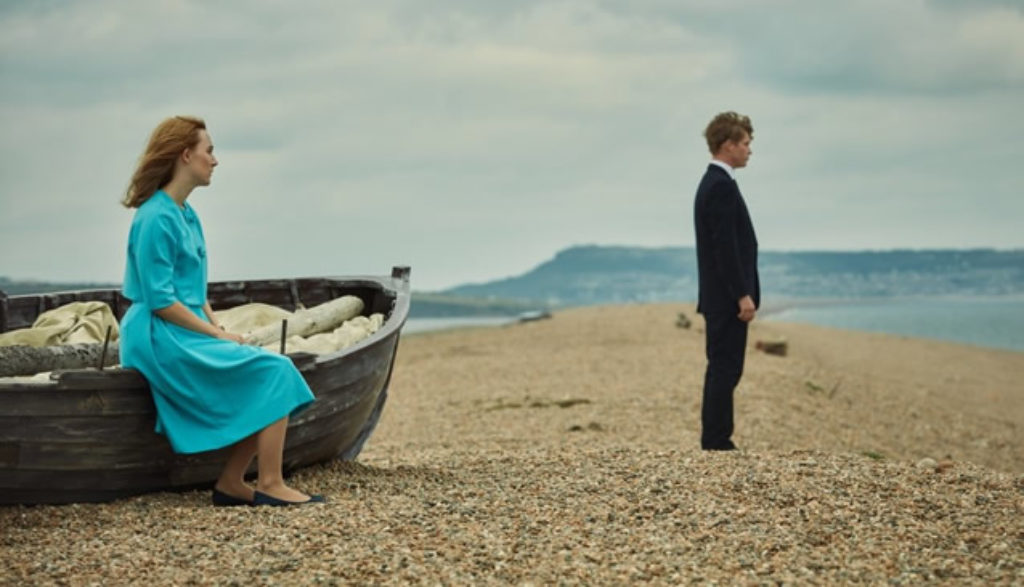
It’s 1962 in England. World War II has passed, and the younger generation is enjoying the freedom their parents fought for. They are liberated.
But young Florence Ponting and Edward Mayhew are still constrained within their own lives. Florence is the daughter of an abusive, white-collar father who provides for his family by running a business and sitting with the big wigs. Edward, meanwhile, is the son of a gentle, working-class man who is emotionally consumed with the fragile mental state of his wife. Though Florence and Edward don’t share the same socioeconomic class, they do share a similar need to be seen and heard.
One day, Edward receives an excellent mark from his university and desperately wants to tell someone about it. But his father is too busy, his mother doesn’t understand, and his sisters don’t care. So he rides into town and happens upon a social rally where a beautiful young woman catches him off guard.
It’s love at first sight, with Florence making her way toward Edward as well, igniting an instant connection. They laugh, sing, dance and spend every possible moment with one another, falling evermore deeply in love.
But as their wedding night approaches, Florence harbors a horrific secret that may utterly dismantle the magical connection she and Edward have experienced up to this point.
[Note: Spoilers are contained in the following sections.]
On Chesil Beach speaks to the power of love and intimacy. We see that when two people connect on a deep emotional level, it creates a foundation of mutual respect that helps a couple to weather difficult storms.
Edward loves his wife, understanding the commitment and intimacy involved in marriage. Florence likewise loves Edward. She wants to do whatever is necessary to make him happy. She desires to spend the rest of her life with him, but we see how deep issues from her past hinder her ability to connect physically with her new husband. (More on that in Sexual Content.)
Both characters are considered the “oddballs” of their families. Florence desires to defy societal norms by marrying a man who is “below” her class. Edward steps up to the challenge of going to university, making good grades and creating a new life for himself beyond the meager economic world he’s grown up in.
Though Florence and Edward fight, they try to work through their differences (at least, for a time). Florence tells Edward that she wants to get to know all of his “sides,” including the bad and ugly ones.
Florence is kind and gentle with Edward’s mother, Marjorie. Florence helps her to cook, clean and restore order to their home. She also unites Edwards’s family in love and encourages interaction in a way that seemed lost after their mother was injured. Because of the rejuvenation that Florence creates within their home, Edward’s father tells him that he should marry her. Florence’s kindness brings Edward to tears.
Florence speaks with a priest about her upcoming marriage.
The main point of conflict in this film is Florence’s strong aversion to sexual intimacy. It is insinuated that she was sexually abused by her father (the camera shows her lying on a bed, cringing, while he is shown behind her, drinking alcohol), but she cannot bring herself to confess this abuse to anyone, not even to her priest or her new husband.
The film constantly alternates from present to past as the couple prepares to consummate their marriage after the wedding ceremony. During their courtship, we see them kiss. Edward attempts to slip his hand up Florence’s thigh in a theatre full of couples making out (which Florence stops). She lies on top of him in the grass. Other scenes have an almost palpable sense of sensuality that simultaneously hints at Florence’s growing terror of complete sexual intimacy.
On their wedding night, though, things get much more difficult. Florence experiences extreme aversion to any kind of physical contact, even the slightest touch. Each time Edward tries to touch her, Florence has flashbacks to her abuse and tries to think of happier moments in her past in order to escape the present. Edward obviously wants to have sex, but Florence prolongs it as long as possible.
Sensual camera shots include him undressing her. We see thighs, legs, and his backside. Their sexual encounter manages to avoid genital nudity, but explicit dialogue makes it clear that the couple hasn’t been able to consummate their marriage.
Florence later mentions a homosexual male couple that lives together. She says this as she tells a very frustrated Edward that she wants to be with him, but is “no good at sex,” calling it “revolting.” Instead, she proposes they live with one another and that he may have sex whomever he wants, as long as he’s happy and free and loves her. Eventually, it’s decided that they will never be able to consummate their marriage.
Because abuse so permeates Florences’ existence, she cannot fully be herself as she fails to muster the courage to tell even her husband of the abuse she’s endured. Edward struggles enormously because he cannot understand his wife and her aversion to sexual intimacy. In his frustration and anger, he calls Florence a list of names. He accuses her of being “frigid,” and says she must be bad at sex.
Later in the film’s chronology, a group of men and women lounge together in a living room in the mid ’70s, discussing open sexuality and the increasingly unfashionable idea of being conventional and monogamous. A group of college-age men sit around at a club, crudely discussing the female anatomy. Similarly, Florence reads from a book called The Sex Manual, where she learns about the male anatomy and how to be intimate with one’s husband.
A couple of other scenes show a woman’s bare breasts. A song mentions a “two-timing woman.” We see women in lingerie.
Though we do not see Florence sexually abused, it’s clearly insinuated. Florence carries a visible fear of her father. In one scene, he yells at her and screams profanities, leaving her shaking and timid. Edward also has a temper; he punches a man in the face and kicks him while he’s on the ground. He also throws things and yells in anger.
Edward’s mother, Marjorie, was hit in the head by a train door in her younger years. Because of the accident, she now suffers from brain damage. While she is functional, she cannot remember many details and is flighty, unpredictable and lost in her own world.
God’s name is misused twice. The British profanity “bloody” is used a handful of times. Other profanities include “d–n,” “h—,” “b–tard” and “b–ch.” Someone is called a “fool” and “square.”
In multiple scenes, people consume wine, beer and other hard liquor, sometimes to excess. They also smoke cigarettes and cigars.
Florence’s father is a powerful, controlling man who does not like to lose; he expects everyone to fall in line and bow to his desires.
Sexual intimacy within the context of marriage, especially when there are problems, is never easy to discuss. That’s true today. And it was certainly true in postwar England, where On Chesil Beach is set.
That lack of discussion, combined with the secret trauma of abuse, seeps toxically into Florence and Edward’s new marriage—and it is heartbreaking. Their courtship is beautiful, a picture of fairy-tale perfection. But too much is left unsaid, and Florence’s unconfessed tragedy ruins their union before it even begins.
The silence between them sits like an elephant in the room, an awkward, palpable tension that’s present throughout the film. The entire time, I longed for Florence to speak about her abuse. I wanted her father’s actions to be brought to light. I wanted Edward to understand.
On Chesil Beach resonated with me, even though I tend to gravitate toward films with happy endings. This story feels as if it wants to speak to those who have been confused and hurt by abuse and silence, especially as it relates to sexual intimacy in marriage. I think it’s safe to say not many films have tried to tackle this sensitive subject.
For all of its poignant themes, though, On Chesil Beach remains an R-rated film in its depiction of marital sexual dysfunction. It’s perhaps not as explicit as it could have been. But there’s much to grapple with here, content-wise, including lingering, sensual scenes that spend a lot of time focusing on the bodies of a bride and groom.

Kristin Smith joined the Plugged In team in 2017. Formerly a Spanish and English teacher, Kristin loves reading literature and eating authentic Mexican tacos. She and her husband, Eddy, love raising their children Judah and Selah. Kristin also has a deep affection for coffee, music, her dog (Cali) and cat (Aslan).